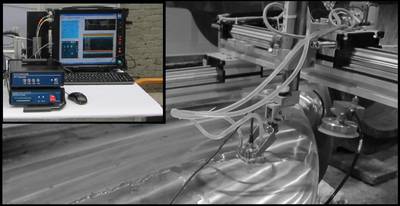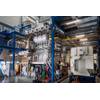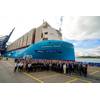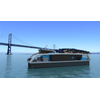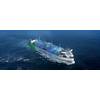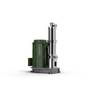During the casting of ship propellers small pores and tiny cracks may often arise within the material, which can lead to failure if not repaired. Testing for defects has typically been carried out manually, though it is difficult to achieve consistent and reproducible results with such manual processes. To overcome this problem MPR, in collaboration with a specialized systems office, has developed a new automated ultrasonic system for inspecting marine drive components, such as ship propellers.
A small lightweight measurement system is used with a mobile scanning device. The system includes all hardware and software components including instrument control, motion control, data acquisition, fast imaging of A-, B- and C-scans, evaluation and documentation tools.
The system is capable of recording large amounts of digitized ultrasonic testing data in real-time. On-site, the system currently scans an inspection area up to 900 x 450 mm and achieves speeds up to 200 millimeters per second. The mobile inspection system can be freely positioned on the propeller geometry; alternatively the scanning device can be attached by suction cups in vertical and horizontal positions.
The mobile inspection and scanning system is available for on-site inspections in foundries, at propeller manufacturers and in dry dock. The use of the system reduces the time for defect inspection and makes the interpretation of the results far easier and more reliable.
MPR will be present at the SMM exhibition in Hamburg where they will be exhibiting as part of S-T Diesel and Marine Group.


